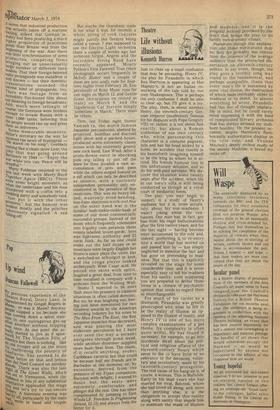Theatre
Life without illusions
Kenneth Hurren
Just to clear up a'small confusion that may be persisting, Henry IV, the play by Pirandello in which Rex Harrison is appearing at Her Majesty's, is not an Italian reworking of the tale told by our own Shakespeare. This is perhaps the only confusion I shall be able to clear up, but I'll give it a try. The play, then, is about another Henry, the eleventh-century German emperor (moderately famous for his disputes with Pope Gregory VII); or, rather, it is not about him exactly, but about a Roman nobleman of our own century who, while personating this character in a costume pageant, falls and has his head kicked by a horse, an accident that results in his henceforth imagining himself to be the king as whom he is attired. His friends humour him in this unfortunate delusion, and so do his well-paid servants. We discover the situation some twenty years after the accident, when life at our hero's villa is still being conducted as though at a royal court of mediaeval times.
The play, you may begin to suspect, is a study of Henry's madness; but it is, more accurately, about his non-madness. I wasn't joking about the confusions. Our man has, in fact, got free from his regal hallucinations after the first twelve years, and for the last eight — having become more accustomed to the role and, indeed, preferring it, to re-entry into a world that has moved on and passed him by — has simply neglected to mention the fact and has gone on pretending to madness. Not that this is explicitly revealed on the stage for some considerable time; and it is never especially easy to tell his madness from his sanity, even supposing you are prepared to define those terms in a climate of psychiatric opinion that tends to regard them as interchangeable.
For much of his career as a dramatist, Pirandello was greatly preoccupied with what he felt to be the reality of illusion as opposed to the illusion of reality, and Henry IV is one of his more complex examinations of a pet theme. Its complexity is often quite wilful. He has found it necessary, for example, to go into inordinate detail about the political and religious affairs of the eleventh-century Henry which seem to rile to have little or no relevance to the decisions, voluntary and involuntary, made by his twentieth-century protagonist. The real cause of his hang-up is, of course, a woman. This is Mathilde. Early in his mad years she had married his rival, Belcredi, whom she had loved all along; and, more than anything else, it is the obligation to accept this reality along with sanity that impels him to maintain the mask of illusion
and madness; and it is the vengeful jealousy provoked by the truth that brings the play to its luridly melodramatic climax. Humdrum though this explanation and these motivations may be, they are probably less remote from the interests of the average audience than the protracted dissertation on eleventh-century politics. In any event, though, the play goes a terribly long way round to the fundamental, and perhaps unarguable, thesis that every man's life is sustained by some vital illusion, the destruction of which leads inevitably either to madness or to death. In almost everything he wrote, Pirandello had this line of thought implacably in mind, but he could rarely resist expressing it with the kind of complicated literary archness that has always aroused my stubborn hostility. On the present occasion, despite Harrison's flamboyantly authoritative display in the title role, and Yvonne Mitchell's deeply etched study of the uneasy Mathilde, it bored my socks off.
































 Previous page
Previous page